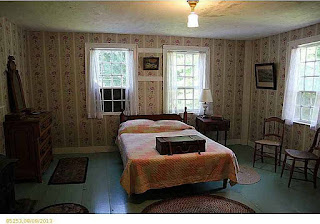One of Henry's friends was a neighbor, David Woodward. Sometime in the 1870s, Henry and his friend, David left for Pennsylvania to work as loggers as they did not like working on their father's farms. But after a few years, they found logging was harder then they had anticipated and not much money for their hard work. They returned home to Maine and Henry returned to life as a farmer with no complaints.
 |
| David Woodward and Henry Paine |
 |

The local newspaper picked up their marriage:
Piscataquis Observer, issue of November 19th 1885:
There was a very pleasant sociable or reception last Saturday at the residence of Mr. Henry Paine, notice of whose marriage was in the last Observer. Although it was a rainy evening, the band was out and added much to the enjoyment of the occasion. Also the nice oyster and pastry supper furnished by Mr. Paine.
They settled in Atkinson and had two children, a daughter Emma in 1886 and a son Walden in 1888. Sadly, Elsie would contract an illness which no details are known other than she had been sick for only a few days in 1891 and died on February 25, 1891.
Henry then became acquainted with another neighbor, Iva (Moulton) Cobb. Her husband had also died in 1891 and left her a young widow with one son, Llewellyn. They both lost their spouses the same year and had young children and both were in need of a mother or a father for their offspring. Whether it was their shared grief or both being in need of a spouse, Henry, then aged 45 years old proposed to the 22 year old widow, Iva Cobb. They were married at the Free Baptist Parsonage on May 27, 1894 in Atkinson, Maine.
Henry and Iva would have four children together before Iva would die from angina in 1910. Henry would continue to raise his children and his wife's son from her first marriage. That was Henry's last marriage as both of his young wives had died before him. His granddaughter, Mildred Carney stated he just vowed he would never marry again. Mildred stated that her grandfather often spoke of how much money he spent on the gravestone in Atkinson for his wives. "The monument cost $25, which must have a lot back for him to pay then by the way he talked about it. Probably took him five years to pay it off," she said jokingly.
Henry continued to live out his life in Atkinson. He mostly stayed at home on his farm and would visit his children and grandchildren and sisters as well. There is a story that two of his sisters did not speak to each and the reason why has never been told, but whatever the reason, Henry could never mention the other sister's name in front of the other.
His granddaughter, Mildred said her grandfather, Henry was a very pious man. He never drank or smoked or swore. He wasn't over religious, but he did go to Church sometimes over in Atkinson with her mother. The worst she ever heard her grandfather say was when she was a child and making too much noise while playing that bothered her grandfather. He said to her "God fer sakes will you stop making that noise." That was the closest she had ever heard him swear and she knew to ve very quiet afterwards.
The later years of his life, he lived with his daughter Elsie or his daughter Grace. The very last year he lived with his daughter Emma (Paine) Moulton. He had returned to his home in Atkinson for the summer in 1933, but was found found dead at his home when his family had not been able to reach him. His date of death was July 26, 1933, the same date he was found at home. His cause of death was "old age."
He was buried with his wives in Gould Cemetery, Atkinson, Maine.









